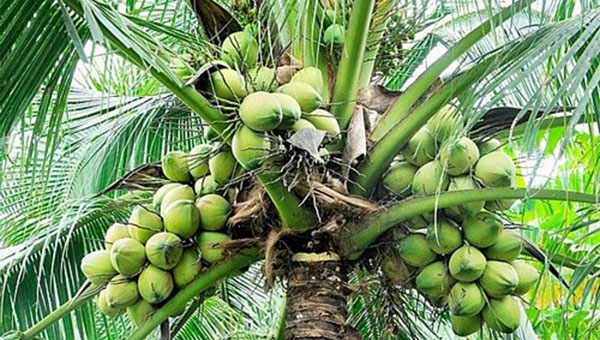By Demion McTair
CMC St. Vincent Correspondent
KINGSTOWN, St. Vincent, Mar. 28, (CMC) – St. Vincent and the Grenadines was once the coconut capital of the Commonwealth.
Coconut oil and other coconut-related products were vibrant and booming, with respectable export figures to other countries in the region, and coconut trees were seen as money growing from the earth.
But now, coconut oil producers, who are trying to revive a long-dormant industry, are considering importing coconuts from Dominica for the sustainability of their enterprises.
According to a 1997 report, by the Inter-American Institute for Cooperation on Agriculture (IICA), “coconut production formed the base for one of St. Vincent and the Grenadines’ long-standing agro-industries — oil and fats extraction and processing.”
The report went on to state, that “since the mid-1980s, however, the viability of the oils and fat industry has been greatly reduced due to significant reductions in demand for coconut-based products, in response to competition of ‘healthier’ substitutes.
“Falling prices for coconut oil induced declines in tree maintenance and copra production. Increased fragmentation of the large coconut estates and the debilitating effects of the spider mite and red ring diseases, were also serious constraints to the industry’s recovery.”
The report stated further, that, as a result of this, “between 1991 and 1995, St. Vincent’s sole factory operated below capacity, with output levels insufficient to maintain operations”.
In the end, the industry could not supply the regional market; the industry was dead.
According to a report by the Caribbean Community (CARICOM) regional transformation program for Agriculture Strategies for the Development of the Coconut Industry, the result of this was “the loss of employment, declining contribution to the national economy and declining contribution to the rural economies and rural livelihoods”.
Amidst all of this, there were still preservers of the coconut heritage, who always refused to be deceived by the widely accepted notion, that coconut oil was less healthy than other oils.
Politicians such as Selmon Walters continued to champion the cause of the revival of the industry in Parliament.
In December 1998, Walters, contributing to the debate on the budget, said, “Mr. Speaker, if I go back a little bit to the coconut industry and the copra industry, right through this country, Mr. Speaker, we have an abundance of coconuts. I realise that a lot of our farmers are wondering what are we going to do with all these coconuts on our hands. The traffickers would take some of it, but a very minor part, the majority of the coconuts, Mr. Speaker, remains here, not being utilised”.
People, particularly those in the Garifuna community, areas such as Sandy Bay, have continued, as a tradition, their cottage-style production of coconut oil, mainly for domestic use.
The CARICOM regional transformation program for Agriculture Strategies for the Development of the Coconut Industry, reporting the 2000 Agricultural census, stated, that, 39,478 coconut trees existed in St. Vincent and the Grenadines in compact plantations, namely Orange Hill estate, Hudley’s estate, Lowmans Windward and Spring.
There were also 32,126 coconut trees in scattered plantings. Trees still also exist, in considerable quantities, in the Gorse, Richmond Vale and Mount Wynne areas.
So what’s the future for the sector? Private, entrepreneurial citizens and entities, such as Val Kelly Investments, Brio Che and Alex Phillips, make coconut oil for retail sale, but still on a small scale.
Many of them have labels and proper packaging, and others are emerging in that regard.
Their core challenges, however, remains the same, namely, the supply of coconuts locally, absence of machinery to ramp up local production, and the overall inability to meet growing local demand for coconut oil, as the oil has reclaimed its rightful place as leading oil, globally, and, competing interests for the local coconuts. Private coconut farmers also suffer from praedial larceny.
Discussions with some of the producers have led to the conclusion that the survival of the industry, at the moment, rests on four main pillars – the traffickers, the coconut oil producers, the bakeries and the sellers, and bottlers of coconut water.
But there is also the suggestion, that if coconut oil is to be competitively priced and readily available on supermarket shelves, in both the extra virgin (cold-pressed) and “ordinary” versions, the issue of supply must be addressed.
One such way to do this, is through the establishment of coconut forest reserves.
Where the state owns considerable amounts of coconut trees, an entity like the Department of Forestry can apply practices and techniques (employed in existing forest reserves), to keep those coconut trees in check, by designating areas with large concentration of coconut trees into “Coconut Forest Reserves”.
That entity can also be responsible for the selling of coconuts to oil producers, from those reserves, thus reducing widespread pilferage and arbitrary harvesting of coconuts in these areas.
This will also help in the maintenance of the trees, the identifying of pests and response thereto, and the planting of dwarf coconut varieties to ensure supply is maintained and that the industry in sustainable.
This will mean income for the government, through coconut sales (locally and regionally), more employment for persons harvesting coconuts and caring for the trees, and industry for the private sector that is buying the coconuts.
The Caribbean Agriculture and Research Development Institute (CARDI) and CARICOM’s Regional Transformation Program for Agriculture Strategies for the Development of the coconut industry, also provided recommendations to get the industry up and running again.
These include, provision of disease-free seedlings to growers; the establishment and implementation of a program of incentives (subsidies, tax credits, etc.) to encourage rehabilitation and refurbishing; and a review of the CARICOM Oils and Fats Agreement, including the Common External Tariff (CET) on competing products.
The proposed Mount Wynne, Peter’s Hope hotel development poses yet another threat to moves to get the industry up and running, too.
Hundreds of trees — mostly aged, but still of value — are expected to be lost, as a result of this development.
Studies, conducted by Spade and Dietchy (1988), showed that coconut oil prevented the formation of hepatic cholesterol esters. In addition, the lauric acid found in coconut oil provides the disease-fighting, fatty acid, monolaurin, which boosts the immune system.
“Coconut reportedly has been proven to have no dangerous trans-fats, which are traditionally found in vegetable oils, margarines and shortenings,” the studies said.
 Pride News Canada's Leader In African Canadian & Caribbean News, Views & Lifestyle
Pride News Canada's Leader In African Canadian & Caribbean News, Views & Lifestyle






